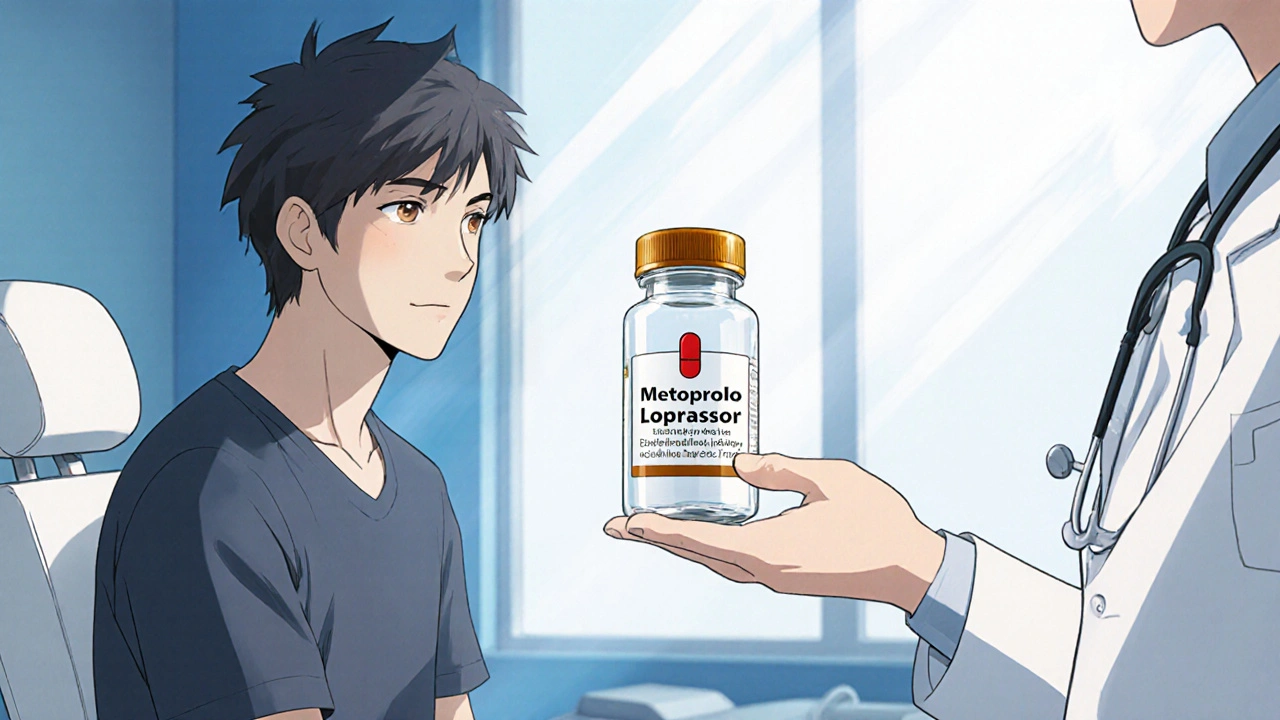When your doctor prescribes a beta‑blocker, you want to know why they chose that specific pill and whether another option might suit you better. Metoprolol is the active ingredient in the brand name Lopressor. It belongs to the cardioselective beta‑blocker class, mainly used for high blood pressure, angina, and heart‑failure management. This guide walks through how Metoprolol stacks up against the most common alternatives - Atenolol, Propranolol, Carvedilol and Bisoprolol - so you can decide if a switch makes sense for your health goals.
Why Metoprolol Is Often the First Choice
Metoprolol works by blocking beta‑1 receptors in the heart, which reduces heart rate and the force of contraction. The result is lower blood pressure and less oxygen demand during physical activity. Because it’s cardioselective, it spares beta‑2 receptors in the lungs, making it a safer option for patients with mild asthma or chronic obstructive pulmonary disease (COPD). Clinical trials from the early 2000s showed that Metoprolol reduces mortality in heart‑failure patients by about 15 %, a figure that still guides prescribing habits today.
Key Alternatives to Consider
While Metoprolol is a solid all‑rounder, other beta‑blockers bring specific strengths. Below is a quick snapshot of the main players:
- Atenolol - another cardioselective blocker, known for a longer half‑life and once‑daily dosing.
- Propranolol - a non‑selective beta‑blocker that also dampens tremors and migraine attacks.
- Carvedilol - a combined beta‑ and alpha‑blocker, useful for patients who need extra vasodilation.
- Bisoprolol - highly cardioselective, often preferred in chronic heart‑failure protocols.
Side‑Effect Profile: What to Expect
Every beta‑blocker can cause fatigue, cold hands, or mild dizziness, but the intensity varies by molecule. Metoprolol’s cardioselectivity typically translates to fewer respiratory side‑effects, while Propranolol’s non‑selectivity can trigger bronchoconstriction in asthma patients. Carvedilol may cause a slightly higher incidence of orthostatic hypotension because of its alpha‑blocking action. Atenolol and Bisoprolol sit somewhere in the middle, with side‑effects largely mirroring Metoprolol’s pattern.
Dosage and Administration Differences
Convenience matters, especially if you’re juggling multiple meds. Metoprolol is available in immediate‑release (often 50 mg twice daily) and extended‑release (100 mg once daily) forms. Atenolol’s longer half‑life means most patients take a single 50 mg dose each morning. Propranolol requires multiple daily doses because its half‑life is only about 4 hours. Carvedilol is usually started at 3.125 mg twice daily and titrated upward. Bisoprolol’s dosing mirrors Metoprolol’s extended‑release schedule, typically 5 mg once daily.

Clinical Scenarios: Which Drug Fits Best?
Imagine three patients with distinct needs:
- Emma, 58, with hypertension and mild COPD. Metoprolol’s cardioselectivity makes it a safe pick, reducing blood pressure without aggravating her lungs.
- Raj, 45, who suffers from migraine headaches. Propranolol’s non‑selective action helps curb migraine frequency, so a switch from Metoprolol could provide dual benefit.
- Laura, 70, with heart‑failure and peripheral edema. Carvedilol’s combined alpha‑blockade eases vascular resistance, often improving edema and exercise tolerance better than Metoprolol alone.
These examples illustrate that “one size fits all” rarely works in cardiovascular therapy. Your personal health picture decides which drug shines.
Cost and Insurance Considerations
In the UK, most beta‑blockers are listed on the NHS formulary, but price differentials still appear in private prescriptions. Metoprolol tablets typically cost £0.30 per tablet, while brand‑name Lopressor can be slightly higher at £0.45. Generic Atenolol and Bisoprolol sit around £0.20, making them the cheapest options. Propranolol’s price hovers near £0.35, and Carvedilol can be £0.50 because of its dual‑action chemistry. If you’re paying out‑of‑pocket, these small gaps add up over a year.
Switching Between Beta‑Blockers: What You Need to Know
Never swap drugs on your own. A proper cross‑taper plan ensures blood pressure stays stable while your body adjusts. A typical Metoprolol‑to‑Atenolol transition might look like this:
- Continue Metoprolol at current dose for three days.
- Introduce Atenolol at 25 mg once daily on day 4.
- Reduce Metoprolol by 25 % on day 7 while maintaining Atenolol.
- Fully discontinue Metoprolol by day 10, confirming blood pressure is within target range.
Doctors may adjust the timeline based on kidney function, age, and existing comorbidities. Always schedule a follow‑up check‑up 1-2 weeks after the switch.

Summary Comparison Table
| Attribute | Metoprolol (Lopressor) | Atenolol | Propranolol | Carvedilol | Bisoprolol |
|---|---|---|---|---|---|
| Beta selectivity | Cardioselective (β1) | Cardioselective (β1) | Non‑selective (β1 & β2) | β1, β2 + α1 blocker | Highly cardioselective (β1) |
| Typical dose | 50 mg BID or 100 mg QD (ER) | 50 mg QD | 40 mg TID | 3.125 mg BID, titrate | 5 mg QD |
| Half‑life | 3-7 h (IR), 7 h (ER) | 6-9 h | 3-4 h | 7-10 h | 10-12 h |
| Key indications | HTN, angina, HF | HTN, angina | HTN, tremor, migraine prophylaxis | HTN, HF, post‑MI | HTN, HF |
| Respiratory side‑effects | Low | Low | Higher (bronchoconstriction) | Low to moderate | Very low |
| Typical cost (UK, generic) | £0.30/pill | £0.20/pill | £0.35/pill | £0.50/pill | £0.20/pill |
Frequently Asked Questions
Can I take Metoprolol if I have asthma?
Because Metoprolol is cardioselective, it blocks mainly β1 receptors in the heart and spares the β2 receptors that keep airways open. Most asthma patients tolerate it well, but you should still discuss dosage with your doctor, especially if your asthma is moderate to severe.
Why would a doctor switch me from Metoprolol to Carvedilol?
Carvedilol adds α1‑blocking activity, which widens blood vessels and reduces after‑load on the heart. For patients with heart‑failure who also have peripheral edema, Carvedilol often improves symptoms more than a pure β1 blocker like Metoprolol.
Is it safe to combine Metoprolol with other blood‑pressure medicines?
Yes, many patients use Metoprolol together with ACE inhibitors, diuretics, or calcium‑channel blockers. The combination can lower blood pressure more effectively, but doctors monitor heart rate closely to avoid excessive slowing.
What should I do if I miss a dose of Metoprolol?
Take the missed tablet as soon as you remember, unless it’s almost time for the next dose. In that case, skip the missed one and continue with your regular schedule - never double‑dose.
Can Metoprolol be used for anxiety?
Off‑label, low‑dose Metoprolol can calm physical symptoms of anxiety such as rapid heartbeat. However, it’s not a first‑line treatment for anxiety disorders; talk therapy and selective serotonin reuptake inhibitors are usually preferred.
Bottom Line: Choose the Right Beta‑Blocker for Your Life
If you need a reliable, cardioselective pill with a solid safety record, Metoprolol (Lopressor) remains a top pick. If you have specific comorbidities-like migraines, severe heart‑failure, or a need for cheaper medication-one of the alternatives may edge it out. Always involve your GP or cardiologist in any switch, and keep an eye on blood pressure, heart rate, and how you feel day‑to‑day.








sara fanisha October 23, 2025
Metoprolol’s a solid pick for many folks-nice cardio‑selective profile and generally easy on the lungs. If you’re happy with your BP and feeling good, stick with it!
Tristram Torres October 24, 2025
Honestly, the author just rehashed Wikipedia. Metoprolol isn’t magically better; the side‑effects list is the same as any beta‑blocker.
Jinny Shin October 24, 2025
The drama of endless switching is almost theatrical-why subject a patient to a carousel of molecules when the evidence is already on the table? One must consider the subtle art of pharmacology, not just the blunt force of price tags.
deepak tanwar October 25, 2025
While the guide praises Metoprolol, rigorous meta‑analyses demonstrate that carvedilol reduces mortality more significantly in heart‑failure cohorts. The data suggest a nuanced hierarchy rather than a blanket endorsement.
Abhishek Kumar October 26, 2025
Sounds like a marketing brochure.
hema khatri October 27, 2025
As an Indian, I can say that we value affordable meds!!! Metoprolol may be cheap, but it’s not always the best for our people’s heart health!!! Consider local guidelines and the real cost to families!!!
Zachary Blackwell October 27, 2025
Don’t forget that pharma pushes Metoprolol because it’s off‑patent, while newer beta‑blockers get more research dollars. The hidden agenda shapes what doctors recommend, even if the science isn’t crystal clear.
prithi mallick October 28, 2025
Choosing a beta‑blocker is more than a pharmacy decision, it’s a dialogue with your own body.
When you listen to the rhythm of your heart, you hear a story that no table can fully capture.
Metoprolol may feel like a familiar friend, yet sometimes a stranger like carvedilol can teach you new lessons about resilience.
Remember that every side‑effect is a signal, not a punishment, pointing you toward deeper self‑awareness.
If you notice cold hands, ask yourself if it’s the drug or perhaps an unspoken stress you’re carrying.
The cost differences, while seemingly trivial, reflect larger economic ecosystems that shape our access to care.
In the grand scheme, the £0.30 per pill versus £0.20 may decide whether a family can afford a month of stability.
Don’t let marketing jargon drown out the simple truth that your well‑being is the ultimate metric.
Sometimes the best move is to stay with what works, but other times the courage to switch mirrors personal growth.
Think of your medication switch like a career change-both require planning, support, and a willingness to face uncertainty.
Your doctor is a guide, but you hold the compass of your own experience.
If you feel dizzy after a dose, note the time, the food, the mood-patterns emerge when you pay attention.
And if you ever wonder about the invisible hands that steer phamarceutical trends, breathe, and focus on what you can control.
Stay patient, stay curious, and keep the conversation going with your healthcare team.
Ultimately, the right beta‑blocker is the one that lets you live life fully, with heart and mind in sync.